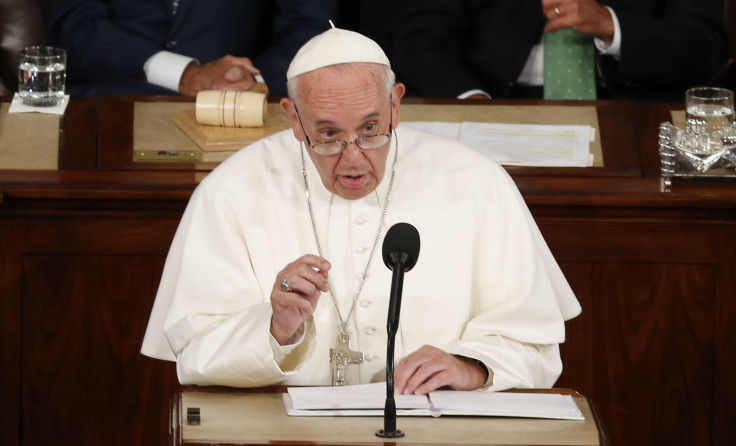
In Pope Francis’ address to the joint meeting of Congress on Thursday, he called on his listeners to “not be taken aback by [migrants’] numbers, but rather view them as persons, seeing their faces and listening to their stories.” Angela D. Morrison sees Pope Francis’ remarks as “a call for Congress to recognize the humanity in every immigrant.” In her op-ed below, Morrison offers three proposals for Congress to put that call into action.
I urge Congress to begin with three changes to U.S. immigration policy that will begin to recognize that humanity. First, prohibit the detention of immigrant children. Second, pass the DREAM Act. Third, provide a pathway to citizenship for the parents of Dreamers.
End Family Detention
Congress must prohibit the detention of children. No stronger example exists of the United States’ current view of immigrant children, as numbers not faces, than the country’s current detention policy.
By statute, Congress permits U.S. immigration authorities to detain even children despite no criminal conviction and no determination that the child has violated civil immigration law.
As documented this month in a United States Commission on Civil Rights report and in July in an American Bar Association report , this has resulted in the long-term detention of children and their families in conditions that are horrifying.
Children have been subjected to strip and pat-down searches by immigration officials, separated from their family members, held in cells without heat, given spoiled food, and either denied medical care or received substandard care.
To U.S. immigration officials and policy-makers, the children were only numbers, exemplified by the fact that the uptick in the number of children detained and a deterioration in conditions occurred right as the U.S. saw an influx of children seeking asylum in 2014.
As the numbers decrease in 2015, the conditions seem to be getting better. But what about the next crises? Unless Congress acts, future upticks will lead to deteriorated conditions once again.
Congress must prohibit, by statute, the detention of children generally, and allow it only in very limited circumstances and under strict guidelines that guarantee U.S immigration officials treat children and their families humanely and with compassion.
Pass The DREAM ACT
Currently, the United States invests in the education of children who are here without authorization but provides no permanent mechanism for the U.S. to benefit from that investment. The Deferred Action for Childhood Arrivals (DACA) program allows some young people to temporarily overcome the challenge of work authorization because approval under the program comes with work authorization for a period of two years.
Nonetheless, DACA bestows no immigration status and is merely an exercise of the administration’s prosecutorial discretion authority.
The DREAM act would provide legal immigration status with a pathway to citizenship for children whose parents brought them to the United States when they were young children. Listening to the stories of each young person and recognizing their talent and skill would lead us to demand Congress pass the DREAM Act.
Pathway To Citizenship For DACA
Provide a pathway to citizenship for the parents of Dreamers. The children who would benefit from the DREAM Act are not here by themselves: they have parents and, often, United States citizen siblings. Children and society benefit from stable families.
The Migration Policy Institute and Urban Institute published a report this month which documents the tremendous harm that results to children and society when parents are deported or detained. Among the harms set out in the report are poor educational and behavioral performance, mental health conditions such as depression, declining socio-economic status, and poor physical health.
To exact this toll on children through immigration policy is the epitome of viewing immigrants as numbers not faces.
The parents, as the Pope recognized, are doing what any good parent would—seeking better opportunities for their children. Recognizing this basic human drive as a community good, should lead Congress to enact legislation that provides a pathway for the parents of Dreamers to earn citizenship.
The Pope’s address provides a rare opportunity for Congress to work in a bipartisan manner on an issue involving morality. To recognize the basic humanity of people who are coming to this country for opportunity for themselves and their children, highlights the good that religious values can promote.
At a time when some members of Congress believe religious rights are under attack, what better way to demonstrate the good that believers can accomplish than to fight for the basic humanity of the most vulnerable migrants to our country?
Angela D. Morrison is an associate professor at Texas A&M University School of Law. She is an expert in immigration and employment law. Professor Morrison formerly taught at UNLV School of Law as a visiting assistant professor in the Thomas & Mack Immigration Clinic. Her previous positions also include serving as the Legal Director of the Nevada Immigrant Resource Project.
The opinions expressed in this op-ed do not necessarily reflect the editorial stance of the Latin Times or IBT media.
© 2025 Latin Times. All rights reserved. Do not reproduce without permission.




